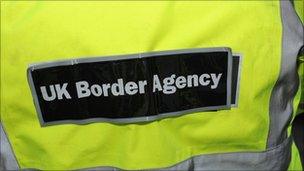More asylum seekers allowed to remain UK
- Published

The UK Border Agency is using more electronic passport checks
More than 30,000 extra asylum seekers have been granted permission to stay in the UK since February, the head of the UK Border Agency has revealed.
Lin Homer told MPs each case was considered on it merits and it was not "just an approach where we have said everybody can stay".
She also confirmed that the agency was "struggling" to deport families of illegal immigrants.
The coalition has vowed to end the detention of migrant children.
Ms Homer was being grilled by the Commons home affairs committee.
'Stable'
Committee chairman Keith Vaz queried what he said was a 4% increase in the number of asylum seekers granted indefinite leave to remain - going up from 38% in July to 42% in September. That came on top of a 30,000 increase in grants since February, when they were handed out in 35% of asylum cases.
He said: "On the one hand the government wants to reduce immigration by tens of thousands, on the other hand UK Border Agency seems to be granting indefinite leave to even more people."
Ms Homer said the number of grants had infact been relatively "stable" and she stressed that the agency was making "good progress" in clearing the backlog of 334,500 asylum cases dating back over four years.
She denied claims that the "spectacular" progress in clearing the backlog was due to a policy of allowing most of them to remain in the UK, saying: "It isn't in any way just an approach where we have said everybody can stay. Each case is looked at individually."
Figures released by UKBA show that 35,000 of the 334,000 backlog cases, or 10.5%, have been removed and 139,000, or 41.6%, have been granted indefinite leave to remain.
Ms Homer said the longer asylum seekers had to wait for their case to be resolved the more likely they were to gain "additional rights" - such as getting married and having children - which prevented them from being removed, she told the committee.
And there were some cases, dating back 13 or 14 years, where "if we had acted more quickly originally we could have refused a case may subsequently have rights that have to be respected".
Sir Andrew Green, of the Migration Watch think tank, said the high rate of settlement grants "shows the chaotic legacy of the previous government".
"All future applications need to be decided in good time with asylum only being granted for genuine cases," he added.
'Struggling'
Ms Homer told the committee new asylum applications were at an "historic low" and there had been a significant improvement in the speed at which they were being dealt with.
UKBA was also "within a couple of per cent" of meeting the target set by the previous government for deporting foreign prisoners.
But she admitted that agency was "struggling" to deport families of illegal immigrants.
She said the number of family "units" removed from the UK every month was in "single figures" compared with 30 a year ago - but a more humane approach to the detention of families and children had made removals harder to achieve.
She said: "It's very difficult to incentivise a family to go if they believe that there are not consequences of saying 'no'."
The Coalition government has pledged to end the detention of children in immigration centres by March next year.
Ms Homer said the numbers detained had fallen but work was continuing to find a "sustainable" alternative.
She also revealed that the UKBA plans to lose 5,000 staff over the next four years, as a result of a 20% cut in its budget. She said this would be achieved through natural wastage and greater use of electronic border controls, which allowed "trustworthy" and previously checked people to enter without further checks.
She confirmed that "e-gate" scanners at British airports had recently failed to pick out a person on a banned list and another person who had entered on their sister's passport.
She said the "e-gate" system was "not completely infallible" and was still in the process of being tested but the agency was confident they were an adequate replacement for immigration officers, who would, in any case, be supervising them.
- Published5 November 2010
- Published7 September 2010